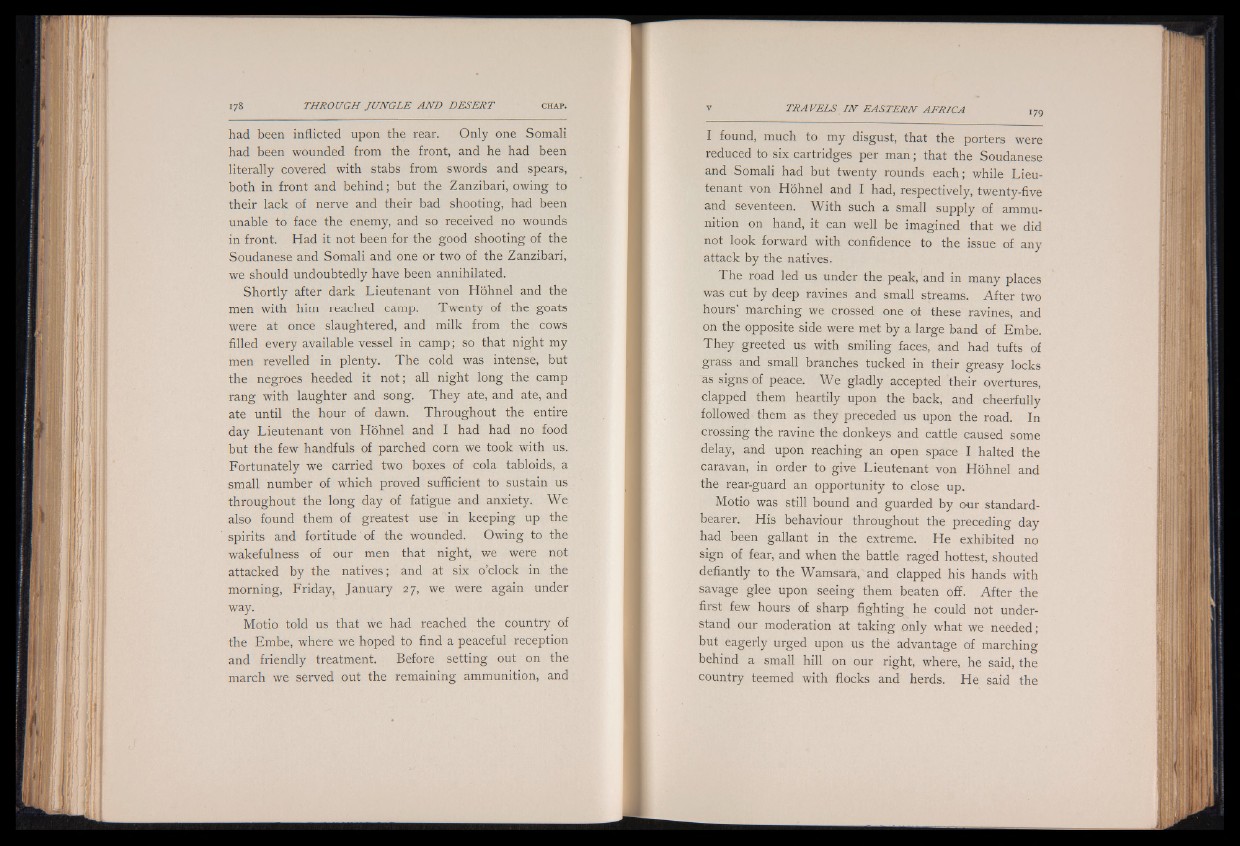
had been inflicted upon the rear. Only one Somali
had been wounded from the front, and he had been
literally covered with stabs from swords and spears,
both in front and behind; but the Zanzibari, owing to
their lack of nerve and their bad shooting, had been
unable to face the enemy, and so received no wounds
in front. Had it not been for the good shooting of the
Soudanese and Somali and one or two of the Zanzibari,
we should undoubtedly have been annihilated.
Shortly after dark Lieutenant von Hohnel and the
men with him reached camp. Twenty of the goats
were at once slaughtered, and milk from the cows
filled every available vessel in camp; so that night my
men revelled in plenty. The cold was intense, but
the negroes heeded it not; all night long the camp
rang with laughter and song. They ate, and ate, and
ate until the hour of dawn. Throughout the entire
day Lieutenant von Hohnel and I had had no food
but the few handfuls of parched corn we took with us.
Fortunately we carried two boxes of cola tabloids, a
small number of which proved sufficient to sustain us
throughout the long day of fatigue and anxiety. We
also found them of greatest use in keeping up the
spirits and fortitude of the wounded. Owing to the
wakefulness of our men that night, we were not
attacked by the natives; and at six o’clock in the
morning, Friday, January 27, we were again under
way.
Motio told us that we had reached the country of
the Embe, where we hoped to find a peaceful reception
and friendly treatment. Before setting out on the
march we served out the remaining ammunition, and
I found, much to my disgust, that the porters were
reduced to six cartridges per man ; that the Soudanese
and Somali had but twenty rounds each; while Lieutenant
von Hohnel and I had, respectively, twenty-five
and seventeen. With such a small supply of ammunition
on hand, it can well be imagined that we did
not look forward with confidence to the issue of any
attack by the natives.
The road led us under the peak, and in many places
was cut by deep ravines and small streams. After two
hours’ marching we crossed one of these ravines, and
on the opposite side were met by a large band of Embe.
They greeted us with smiling faces, and had tufts of
grass and small branches tucked in their greasy locks
as signs of peace. We gladly accepted their overtures,
clapped them heartily upon the back, and cheerfully
followed them as they preceded us upon the road. In
crossing the ravine the donkeys and cattle caused some
delay, and upon reaching an open space I halted the
caravan, in order to give Lieutenant von Hohnel and
the rear-guard an opportunity to close up.
Motio was still bound and guarded by our standard-
bearer. His behaviour throughout the preceding day
had been gallant in the extreme. He exhibited no
sign of fear, and when the battle raged hottest, shouted
defiantly to the Wamsara, and clapped his hands with
savage glee upon seeing them beaten off. After the
first few hours of sharp fighting he could not understand
our moderation at taking only what we needed ;
but eagerly urged upon us thé advantage of marching
behind a small hill on our right, where, he said, the
country teemed with flocks and herds. He said the